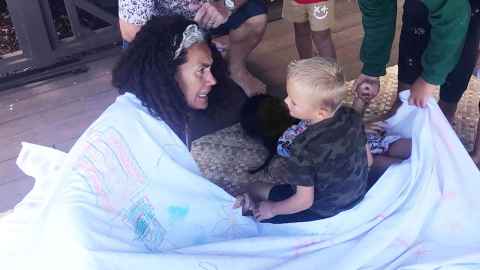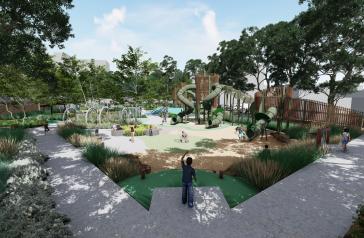People living with dementia are being encouraged to do more daily tasks rather than have things done for them as part of a collaborative project that aims to enable them to live fuller lives.
The Monash University-led Living Well Together (LWT) care model was designed to meet the needs of Baptcare Residential Aged Care residents, including those living with cognitive impairment or dementia.
The partnership between Baptcare and Monash University’s Health and Social Care Unit (HSCU) is already making a difference at its Brookview Community pilot site in Melbourne’s northern suburbs.
Using a holistic Montessori approach to dementia and ageing, LWT encompasses residents, staff and visitors. Among other things, features include children’s playground equipment, kids’ corners with books, toys, comfy lounges and re-imagining the residents’ activity room to look like a café.
Colourful artwork and murals adorn the walls, and instructional signs welcome and empower residents to give activities a go – from making their own cups of tea to watering and gardening.
Baptcare Chief Executive Officer Geraldine Lannon is excited about the new model. “This program focuses on what matters to each resident, and what gives them meaning and purpose,” she said.
“Our model of care will support staff to work alongside residents and to support them to live their fullest lives. I’m incredibly excited and proud of this work and thank everyone involved.”
LWT follows a comprehensive body of work that saw HSCU researchers embedded in the development process with Baptcare to co-design a new way to support those living with cognitive impairment or dementia.
Led by Associate Professor Darshini Ayton, initial literature reviews allowed the HSCU group to identify five domains that were key for best-practice care:
- Person-centred care
- Dementia-friendly environments
- Workforce training and capacity building
- Integration and coordination
- Clinical care
“Often research has focussed on just one of these domains, but Baptcare suggested that we incorporate all five domains to achieve a more holistic model of care, which was really exciting,” Associate Professor Ayton said.
“From there we began our journey to an evidence-based and fully co-designed model of care that involved residents, families and staff.”
Associate Professor Ayton said Montessori for Dementia and Ageing, which focussed on person-centred care, was a key element. “Montessori focuses on the person and the environment, and how the environment can be adapted to promote choice, independence and function,” she said.
“It’s moving away from a task-oriented approach to care, to being more person-centred. Allowing people to do things for themselves as much as possible helps because we know that providing people with that agency can improve and maintain their function, mobility and quality of life.”
Living Well Together launched recently at Baptcare’s Brookview and Strathalan residential aged care communities as pilot sites before the program rolls out at the 14 other aged care sites across Victoria and Tasmania. “This model isn’t static. We will learn and refine, we will add and we’ll modify,” Associate Professor Ayton said.
Baptcare’s Living Well Together Program Manager, Susan Lyon, said staff had embraced the model. “Our frontline staff are the best resource we have,” she said. “This project is about promoting identity, independence and working alongside – doing with our residents, not for them.”
Associate Professor Ayton hopes the model would inspire other organisations. “This isn’t a single intervention,” she said. “It’s multiple interventions that have come together and are actually working together. They’re talking to each other.”
“And you can see the penny drop with staff. They’ve realised, ‘oh, when I fill out that assessment comprehensively, it helps me design a meaningful activity or purposeful role for that resident. And then that resident goes on and does these things throughout the day, and they’re less bored. And therefore, they have a better quality of life.'”








